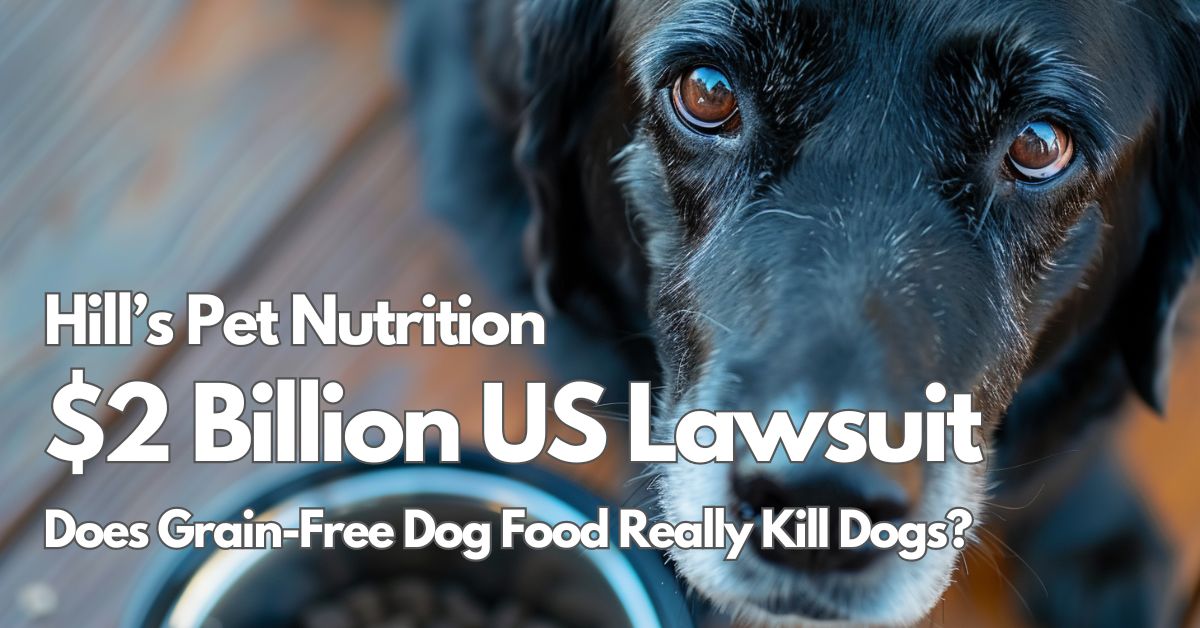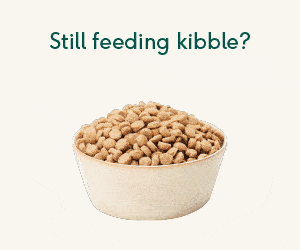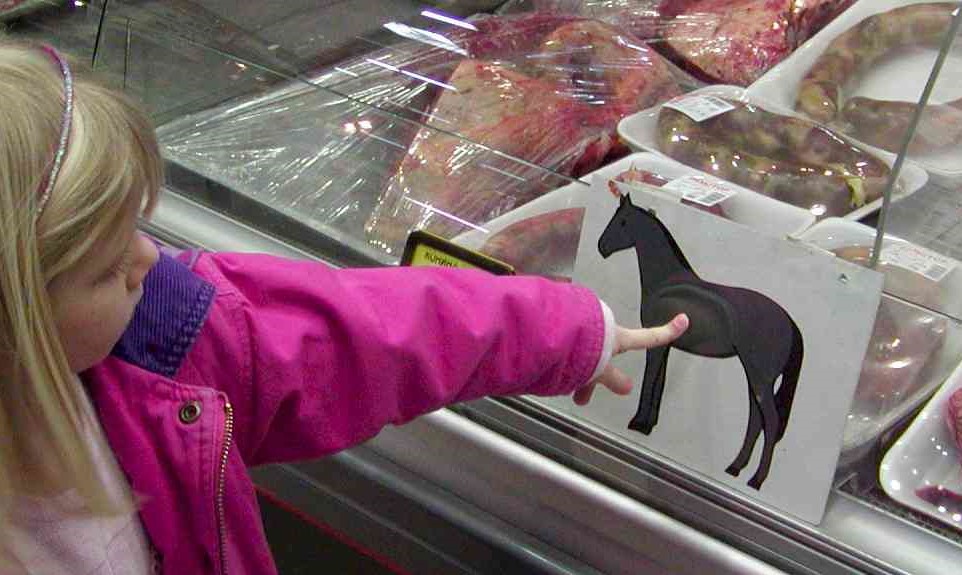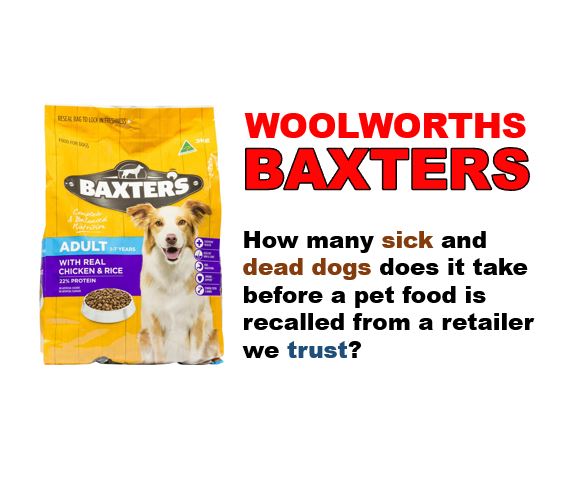
There’s some fascinating conspiratorial tin-foil hat stuff happening in the world of pet food right now. Even if you don’t care too much about the pet food business itself, you may find this interesting in a “Is that how the world works?” kinda way.
I’ll try not to bore you with the details, but an epic David vs. Goliath battle has been unleashed against the company who stocks the shelves at your local vets – Colgate Palmolive’s Hill’s Pet Nutrition. The “scientific” brand, and the expensive grain-inclusive “prescription” brand you’re told you must feed your pet carnivore when they get sick.
Hill’s are being sued in a class action lawsuit for a whopping $2 Billion US dollars (that’s upwards of $3 Billion AUD!)
When you consider Hill’s are the 3rd biggest pet food giant after Mars and Nestle (more famous for chocolate bars), and the pet food industry itself is worth billions, this could really be an epic battle considering what the lawsuit is about. What matters more to us, is it relates to the “science” which tells us what’s healthy for our pets. It relates to what we’re told on social media, what our vets are told to believe and consequentially tell us to believe, and how we treat our dogs when they get sick.
You may already be familiar with what the lawsuit is about – have you heard on social media about grain free dog food causing heart disease and killing dogs?
Pretty scary stuff.
I’m sure if your vet told you to stop feeding grain-free foods or it will kill your dog, you would be resoundingly convinced, and tell anyone you know grain-free foods can kill their dogs.
I know, because I’ve heard this seemingly endless times.
But what if it isn’t true?
What if it wasn’t about grain or grain-free at all, but lack of animal ingredients in a kibble?
The lawsuit claims Hill’s made fraudulent claims about grain-free “boutique”, or “BEG” diets causing a deadly heart disease in dogs.
In short, it alleges Hill’s, a company which spends millions in “scientific research” to teach us what we must feed our pets (and you should assume to sell their products), might have spread false claims.
But why?
To understand the significance of the lawsuit, we must first understand the balance of the pet food industry up to 2018 when this all kicked off.
Here’s some stats:
Prior to 2018, smaller pet food companies selling grain-free foods were exploding. In 2011 these companies had a 15% market share. Come 2018 this had risen to 44% in pet food stores in the US selling these increasingly popular brands.
Smaller grain-free pet food companies were drastically cutting in to the profits of three of the biggest, most powerful companies in the world. Our new era of social media meant pet food owners the world over, rightly or wrongly, were spreading the word grain-free foods were healthier than the grain-inclusive foods we’d come to feed our pets without question.
Up until 2018 the profit being made by Hill’s had fallen flat. Mars and Nestle, powerful as they are, continued to increase profits, but perhaps not to the same extent they would’ve liked.
All that changed in 2018 when Dr. Lisa Freeman, DVM, PhD, DACVIM (Nutrition), working as a veterinary nutritionist at Cummings School of Veterinary Medicine at Tufts University, unleashed on the world a hypothesis that grain-free foods may cause heart disease in dogs.
Given her credentials you may take this as scientific fact, but note the words hypothesis and may.
It was just a theory.
You may become more dubious when you read the ethics declaration in Dr. Lisa Freeman’s study Investigation of diets associated with dilated cardiomyopathy in dogs using foodomics analysis.
Let me quote for convenience:
“In the last 3 years, Dr. Freeman has received research funding from, given sponsored lectures for, and/or provided professional services to Aratana Therapeutics, Elanco, Hill’s Pet Nutrition, Nestlé Purina PetCare, P&G Pet Care (now Mars), and Royal Canin.”
Feel free to read the study, but do you consider it a conflict of interest when Dr. Lisa Freeman was receiving funding from all three pet food giants producing most of the world’s grain-inclusive pet foods?
If that isn’t interesting enough, what happened next you may consider as baseless defamation.
Based on Freeman’s theory, the U.S. Food and Drug Administration (FDA) unleashed an investigation. Many people across the world heard about the investigation, and it was widely publicised by media, but not many heard about the investigation being subsequently dropped due to lack of evidence.
Nevertheless, the FDA, for some reason, and with very little evidence, choose to publicise a list of grain-free pet food companies who’s food, they suggested, may kill your dog.
You can imagine how severely damaged those companies were as a result?
If you heard on the news the dog food you were currently feeding may kill your dog, I think you would stop feeding it, wouldn’t you?
Two of the biggest brands affected were Orijen and ACANA, made by Champion Petfoods, which ironically are two brands I still consider very good, even if the terrible damage done by the FDA investigation meant they were subsequently acquired by Mars Petcare – can you see the irony of that?
To offer my personal opinion, I have always considered what I call the “DCM Scare” a powerplay. It was clear to me the threat posed by smaller pet food manufacturers, and it’s clear how the events of 2018 changed the landscape of the pet food industry more in favour of those pet food giants.
Personally, I wonder why Hill’s were the target and not Mars and Nestle. Even if the allegations are true, which I must add they may not be (we will likely never know), how would we know which of the three giants were behind it?
Perhaps Hill’s were the easiest target?
We should also consider the David in this David vs. Goliath battle, a grain-free pet food company called KetoNatural. What are their motivations?
It has to be said this is a win win for them, and I’m sure they will make a great deal of money whether they win or lose.
Had you heard of them before?
I hadn’t.
KetoNatural make a range of dry dog foods which are high protein, low carb, and what you may consider more species appropriate for a dog. I know very little about the company, based in the US, but I’m sure they will sell a great deal of pet food off the back of the lawsuit.
When it comes to grain versus grain-free foods, I’ve always seen the real issue as a lack of animal ingredients.
I saw Diet-related Canine Dilated Cardiomyopathy very likely the result of not feeding a dog a diet of animal ingredients, and not meeting the nutritional needs of an animal which would historically and naturally have consumed an animal-based diet.
Needless to say, many dogs who suffer diet-related DCM are tested taurine deficient, and taurine is primarily sourced from meat, fish, poultry, and dairy products. In fact, taurine is a requirement in a feline diet for this very reason – it causes DCM in cats, as well as retinal degeneration and reproductive issues.
Are dogs that different?
For a pet food manufacturer, animal ingredients (especially decent animal ingredients), are much more expensive than non-meat ingredients. Most grain ingredients, such as the wheat and cereal by-products you find in many cheaper brands of both dog and cat food, are very cheap ingredients.
That means the less meat and more carbs in a formula, the cheaper it is to produce. That leaves the marketing department to convince us why we should feed such products to our pets, and this is something they consistently do very well at.
What are your thoughts?
Are the pet food giants ethical when they fund scientific research which tells us what is healthy or unhealthy for our pets?
I’m sure a lot of good has come out of this research, but is it all honest?
These are businesses at the end of the day, and the nature of a successful business is to make profit. These pet food giants are where they are today from doing just that, and we’re talking billions in profit from selling us pet foods.
Thanks for reading – I hope you found this interesting!
David
Please note the content in this article includes my opinion, and it is up to you to decide whether it is valid or how it may influence what you feed your pets.




